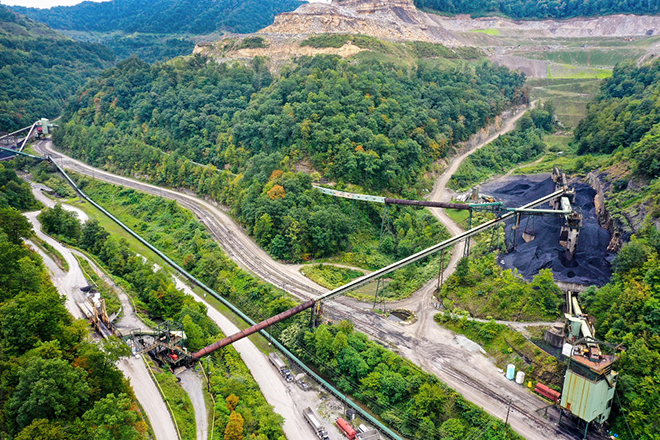A Smoking Hole in the Ground - Blackjewel's Coal Bankruptcy Plan Raises Concern

January 16, 2021 - During a recent wave of bankruptcies in the U.S. coal sector, Blackjewel LLC and its affiliates emerged as a vehicle for some of the least-wanted assets of larger producers looking to lean operations. The company is now trying to close the book on a bankruptcy reorganization that started in July 2019, causing uncertainty for many of its coal mining permits.
A hearing is scheduled Jan. 15 before the U.S. Bankruptcy Court for the Southern District of West Virginia to confirm the Blackjewel reorganization plan, which includes a request to abandon coal permits in Kentucky, West Virginia, Virginia and Tennessee. Objectors include state and federal regulators, environmental groups, and sureties who say the move could endanger local communities.

|
Coal is mined from a mountainside at a strip mine operation near Pikeville, Ky., on Aug. 24, 2019.
Source: Scott Olson/Getty Images News via Getty Images
|
Many of those objecting, such as a group that includes Blackjewel's former president and CEO, Jeffery Hoops, pointed out in court filings that the attorneys and other professionals working to complete the bankruptcy would still be paid under the plan but others would be left to pick up the tab for reclamation.
"The results of these Chapter 11 cases have been catastrophic," attorneys representing the group of objecting parties wrote in a Jan. 11 filing. "The debtors' professionals and corporate fiduciaries preside over a figurative smoking hole in the ground."
Cheap Coal Buys May Have Been a Bad Bet
Blackjewel was one of several coal companies that grew by buying the coal assets of larger U.S. producers during a wave of bankruptcies that swept the sector. Many of those companies later filed a new round of bankruptcy filings after acquiring the mines at low cost or agreeing to cover asset reclamation obligations.
Blackjewel also sat on many of the permits and has not been required to complete many reclamation duties, according to Mary Cromer, deputy director of Appalachian Citizens' Law Center Inc.
Cromer expressed concern that dissolving coal companies will be able to abandon mines that were more of a liability than an asset from the start as a "new norm."
"I see this bankruptcy as sort the inevitable outcome of the bankruptcies that were occurring in late 2014 and 2015," Cromer said. "Now we're at the end result of that, which I think was a foregone conclusion back in 2014, when they bought these permits. They were not going to produce any coal."
'I'm Worried That the Mountain Will Come Down'
Of the 187 Kentucky mining permits Blackjewel hopes to abandon, 150 had 587 outstanding environmental violations, attorneys representing Kentucky's Energy and Environment Cabinet said in a Jan. 11 filing. At one point during the reorganization, Kentucky said Blackjewel and its affiliates had racked up 30% of the state's outstanding violations.
Violations include pollution discharges into Kentucky waters, landslides, and overflowing ponds that pose an immediate risk to citizens, according to the Jan. 11 filing. Kentucky officials estimated the estate's reclamation obligations exceed the value of its reclamation bonds by over $20 million.
"[Blackjewel and its affiliates] argue that if they are permitted to abandon the permits, that the bonds will provide adequate assurance of protection to ensure protection of public health and safety," attorneys representing Kentucky wrote. "This could not be further from the truth."
Tracy Neece, a resident of Harold, Ky., owns three rental properties near a mine operated by Blackjewel affiliate Revelation Energy LLC. Revelation took over the site from James River Coal Co. after it filed for bankruptcy in exchange for $1 million and land reclamation obligations, Neece wrote to the court.
Neece said he has observed several issues caused by the mine site, including loose rock and sediment near the property and in nearby waterways. "There are probably eight kids living in those three properties," Neece wrote in the filing. "I'm worried that the mountain will come down and kill someone."
A Rocky Start to Bankruptcy
Blackjewel's bankruptcy got off to a rocky start. The company closed its mines early on due to issues with its initial bankruptcy refinancing package. The disruption led to sudden layoffs and employees leading protests and lawsuits over lost wages. Ultimately, the lenders who backed a restructuring package stipulated that Hoops must resign.

|
Unemployed Blackjewel coal miners, their family members and activists Aug. 24, 2019, at a blockade of the railroad tracks leading to the site where the miners once worked in Cumberland, Ky.
Source: Scott Olson/Getty Images News via Getty Images
|
Blackjewel has since alleged that Hoops undertook "numerous improper, unfair, and unreasonable transactions" before the bankruptcy. The former executive has been advised by his attorneys not to comment on the case, he recently told S&P Global Market Intelligence.
Hoops faced legal troubles even before the bankruptcy and an expansion of his enterprise into the Powder River Basin, including a court order that his company to pay Fifth Third Bank NA after repeatedly defaulting on loan obligations.
Coal Sector Changes Complicate Financial Dealings
Some of the permits Blackjewel seeks to abandon were sold to other entities but have hit snags in the permit transfer process.
The sales have been complicated by the broader trend of bankruptcies and legal challenges plaguing the coal sector. Black Mountain Resources LLC set out to buy 14 permits from the Blackjewel bankruptcy for a credit bid of just $134,900, according to a Jan. 12 court filing.
Black Mountain said it made significant efforts to close the deal but could not obtain bonding coverage on "commercially reasonable terms." The company noted that numerous bond companies left the coal sector in the past few years as the industry evolved.
Those that remain have increased collateral requirements beyond management's expectations based on prior experiences operating in the sector, the company wrote.
'Will the Court Protect the Public?' – Sureties
Depending on the court's ruling, the companies that already bonded the properties held by Blackjewel and its affiliates stand to be on the hook for millions of dollars in reclamation obligations.
The Indemnity National Insurance Co. noted that hundreds of notices of violations, cessations orders and determinations of bond forfeiture were issued based on Blackjewel's failure to follow federal mining safety laws. Though the company has generated $68 million in cash proceeds from selling assets since the bankruptcy and touted that it was not administratively insolvent, Blackjewel has not worked to resolve the violations or ensure legal compliance, Indemnity National wrote in a Jan. 11 filing.
First Surety Corp. wrote to the court Jan. 11 that it faces "imminent exposure" of $4.0 million related to bonding at Blackjewel's Rush Creek mine in West Virginia. Initial research at the site indicates the mine is discharging acidic water or an elevated concentration of pollutants into the environment, the surety said.
Lexon Insurance Co. and Sompo International Insurance also objected to Blackjewel's plan and said in a joint same-day filing that the company has accomplished "little or no priority environmental reclamation." As of the start of the bankruptcy, the two firms had executed bonds totaling $343 million on behalf of Blackjewel and related entities.
"Whether the harm is immediate, imminent, or will happen in the near future is immaterial," the attorneys warned. "Will the court protect the public when it can or not is ultimately the question."
Blackjewel Defends Right to Abandon
Blackjewel defended its legal right to abandon the properties. The company said in a separate Jan. 11 filing that it had proposed the creation of a trust to manage its reclamation obligations but could not get the support of state regulators or its surety providers.
The company plans to present evidence that it has exhausted options to sell or transfer permits to other companies and lacks the funds to perform the required remediation.
"Environmental requirements do not trump the protections of bankruptcy law, and will not take precedence absent a finding that 'the public health or safety is threatened with imminent and identifiable harm,'" Blackjewel wrote.
The company argued that because the permits are bonded, the sureties will be obligated to forfeit bonds to the states and "actually facilitate more timely action to address conditions at the remaining permit locations."

